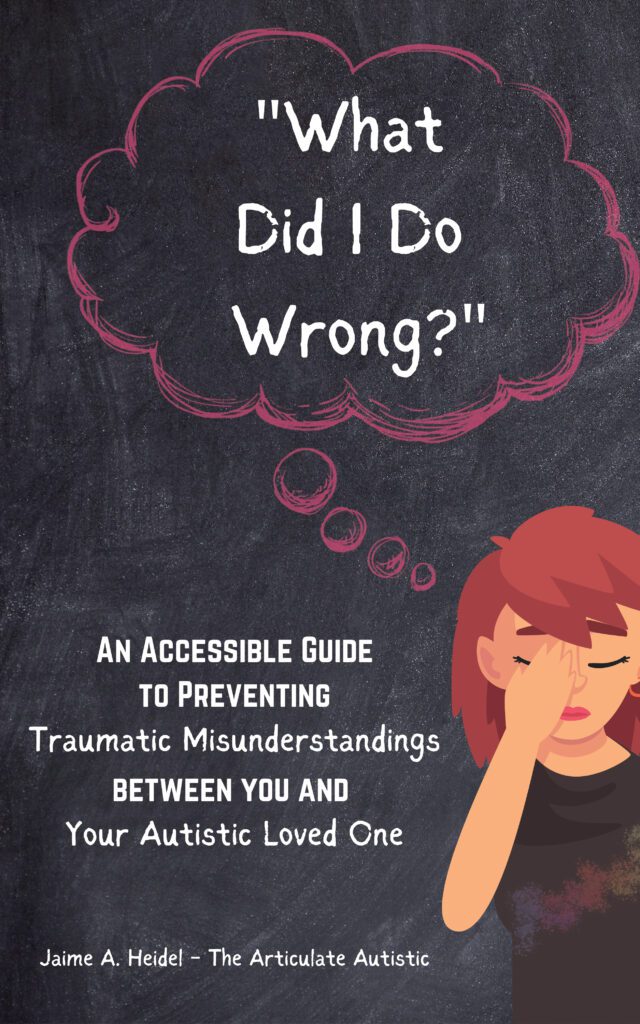Why Your Autistic Loved One Understands You Better When You’re Having a Wits’-End Emotional Outburst

If you’re a neurotypical person with an autistic loved one, you may have experienced the following:
You’re upset about something they said, something they did, a certain tone of voice they used, or maybe even something they didn’t do. You’ve told and told and told them, but they just don’t seem to care at all about your feelings. The only time they seem to respond to you is when you’re screaming, shouting, and crying! Why is that?
It’s not for the reasons you may think.
In fact, autistic people are often mistaken for being purposefully cruel and/or gaslighting their loved ones and treated accordingly by them, and this can be emotionally damaging because the autistic person is unaware that they are causing upset, yet they are being punished for something anyway.
So, if it’s not on purpose, how could someone who claims to love you only respond when you’re at your wits’ end?
Because that’s the only time you’re speaking our language!
Here’s the thing; we aren’t only capable of caring about you when you’re on the floor sobbing. That’s not it at all. This is a miscommunication. You may think that you’ve told and told and told us something, but you really haven’t. Or, what would be better to say is, you’ve told us through facial expressions, body language, hints, the silent treatment, withholding of affection, etc., and, even though you mistakenly believe we don’t care and that’s why we aren’t responding to you, we aren’t reading or registering any of this.
We’re not ignoring you, we don’t even realize you’re attempting to communicate with us!
Many autistic people are as blind to facial expressions, body language, and subtle hints as a colorblind person is to red, green, blue, purple, etc. Yet, if you knew somebody was colorblind, you wouldn’t get upset with them if they couldn’t organize color-coded files, would you?
It’s the same principle with us.
Here’s what I’ve come to understand: Neurotypical people, by and large, communicate through facial expressions, body language, subtle hints, and withholding. Fellow neurotypical people can usually figure out what others are feeling and respond accordingly based on this type of communication.
Failure to do so would indicate that the other person is aware of the problem but doesn’t care. This is not the case with autistic people.
Again, it’s not that we don’t care. We don’t understand. It would be no different than you expressing your feelings in Swahili and an English-speaking person staring at you blankly or not even looking at you because they don’t recognize the language you’re using.
If you want us to understand how you’re feeling and what you want us to do, you have to be blunt and direct. That’s it.
And use this formula:
- Be sure you have our undivided attention. (This is crucial.)
- Tell us you need to speak with us about something important.
- Reassure us that we are safe. (Many of us are used to being screamed at, abused, fired, broken up with, etc. whenever somebody wants to “talk”.)
- Tell us what you feel went wrong.
- Tell us why it is wrong or upsetting to you. (Why is critical. Do NOT skip this part, or your autistic loved one will not be able to make the connection in future.)
- Tell us what you’d like us to do differently.
- Be very specific.
- Always allow questions.
“But, My Autistic Loved One DOES Understand Me When I’m Sobbing and Screaming!”
“Wait a minute,” you think. “My autistic loved one not only seems to understand me when I’m upset and screaming, but then they start crying, and then I have to comfort them!”
You want to know why? Because an upset neurotypical person who is at their wits’ end is no longer hinting at anything. They are speaking their emotions straight out because they have nothing left to lose.
A neurotypical person with nothing left to lose in the emotional sense speaks very similarly to the way autistic people speak all day long regardless of emotional state: Bluntly and directly.
And, as far as the having to comfort us thing, yes. You’re right. You do. And I can explain that, too. Considering we had no idea anything was wrong until you started sobbing, once we see the emotional state you’re in and realize that WE caused that, it is DEVASTATING for us! We can’t believe we were capable of causing that much pain when we had no idea anything was wrong.
Neurotypical emotions seem to go from 0 to 60 very quickly to us because your last straw is often our first clue. Furthermore, sudden neurotypical emotional outbursts (since they seem to come out of nowhere for us) can be very emotionally jarring because they startle us. It’s like we were just sipping tea and reading a book quietly when a herd of elephants broke down the door and thundered on in.
The Takeaway
Don’t hint, be blunt, and tell us right away when something feels wrong for you by following the formula I outlined above.
Learn more about how your autistic loved one experiences the world and connects with others by picking up a copy of my book, “What Did I Do Wrong?”




